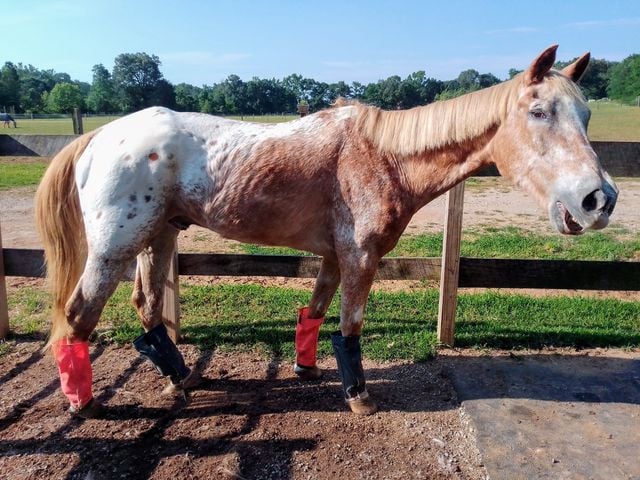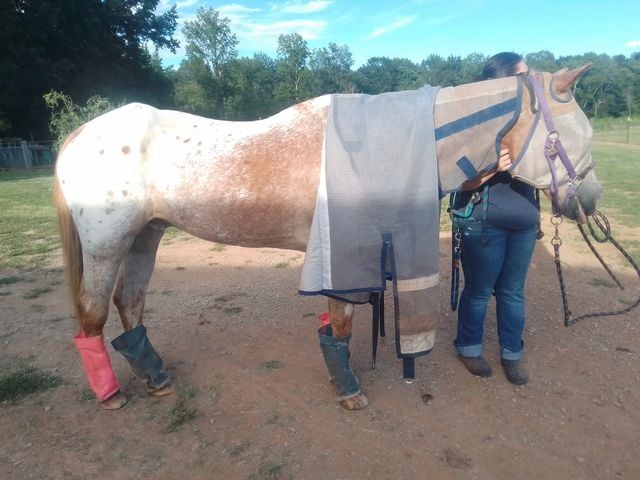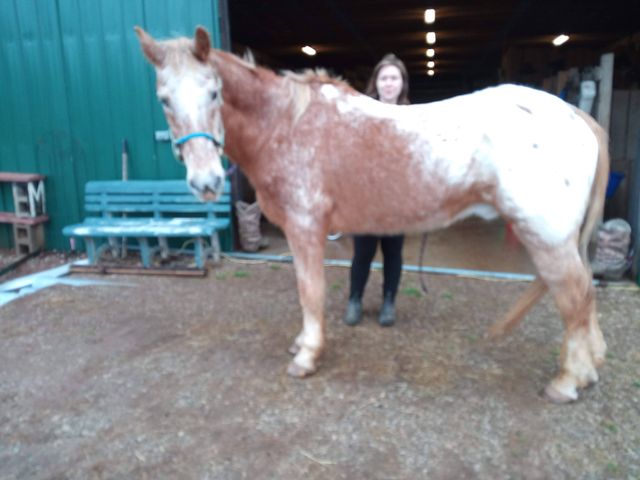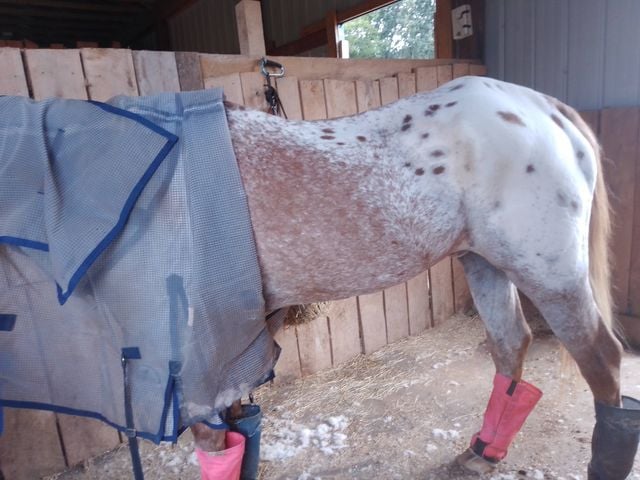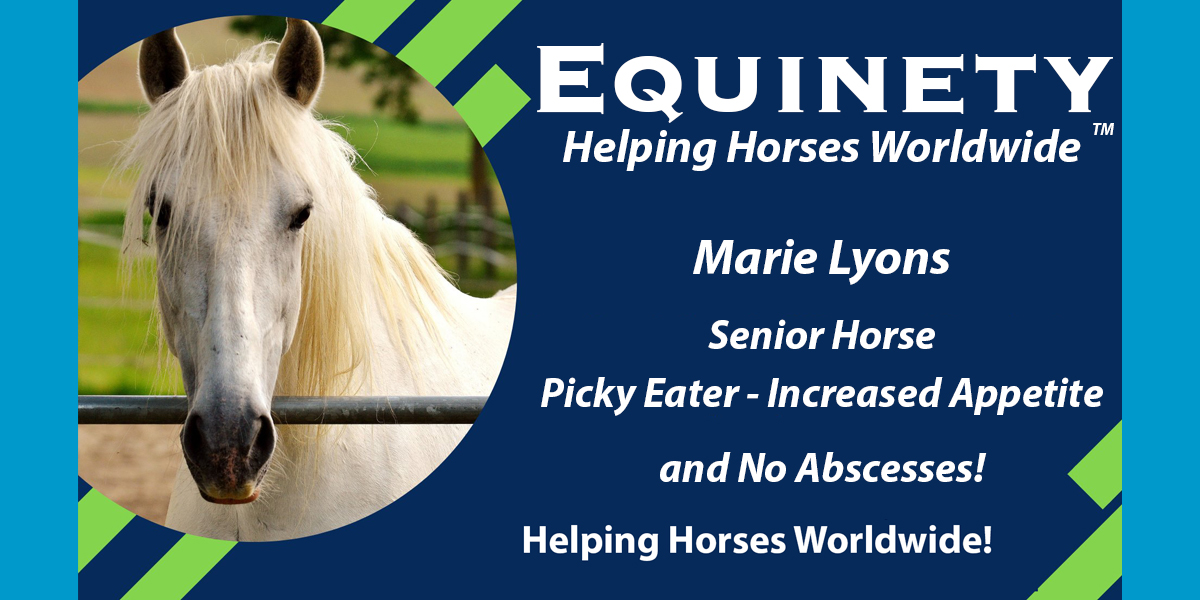Marie Lyons – 41 year old senior horse - Picky Eater – Increased appetite – No abscesses
John Dowdy:
Hello, and welcome to this week. Equinety podcast. We are swinging up into Alabama. We've got Marie Lions on the call this week, Marie, welcome to the Equinety podcast.
Marie Lyons:
Thanks for asking me on and on. Really got the shot.
John Dowdy:
Good because this time, and I think if memory serves me correctly, this is the oldest horse that we've had sponsored or not sponsored, but highlighted rather on the Equinety podcast. Tell us about your senior horse. How old is this horse?
Marie Lyons:
He's 41. Yeah. Right. I'm going with an estimate with that because when I got him, they weren't a hundred percent sure, but they thought he was 12 and that was in 93.
John Dowdy:
What's funny is, is when you told me that, that, Oh, you acquired him when he was 12 in 1993. And I'm trying to do the math. I'm like Holy smokes. This horse is up there, so I would, I would imagine this horse has a little personality. Tell us about him.
Marie Lyons:
He is. Yes. He looks personality that's for sure. He is probably one of the boldest horses I've ever ridden. He also, when he came to me, he came without steering and without great. Basically he went to trade bodies, but over the time that I've had him, he's been Fox hunting. He's been eventing. He's actually done dressage. If you want to ride two Pogo sticks was not the most elegant dressage horse. Very bold jump up. If you faced him at anything, be prepared to go for it. And if it was scary, he just lifted way the hell about that. So you did an ear inspection, but he was amazing. Amazing horse. Just your old round athletes were boned. Appaloosa.
John Dowdy:
Wow.
Marie Lyons:
Yep.
John Dowdy:
How long had you, or let's reverse this question. At what point did you start running into some challenges with this senior horse?
Marie Lyons:
Probably when he was about 33 right about that time, funnily enough, he was still eventing at that time. Low level know baby green anneba, but I mean, he'd go out there and take somebody around the local event course and do walk troughs and not kill anybody. But what I noticed, I was having a problem, especially in the summer and everybody can say in the summer he would turn his nose up at me. I mean, he's looked at me, I served him steak and potatoes. The horse version of steak and potatoes. And this horse would give me the look like you're kidding. Right? You want me to eat that? I don't think so. What I, yeah. So what I would do would be, I would stuff food down this creature all winter, because at that point, you know, the grass wasn't out that, so there was no salads.
Marie Lyons:
So he would, you know, I see how much I could bolt down his face. And then I would watch that dissipate until sort of October and the grass died and then I could stop feeding him because, you know, I could, I would spend my entire time trying to get food down his face. So well, all the way up until probably two years ago. And at that point, I mean, I, I need horsey dentures for this thing because I don't think that many teeth left in his head. So everything's got to be mush. But if you do it as mush as she says, I'm not looking at me, I'm strong. I didn't meet mush anyway. So, you know, hello, excuse me. So anyway, but how it turned out that I ended up on Equinety was a friend of mine who had boarded at another stable, came back with a horse and I had taken care of this horse before I would take, it will take 12 years.
Marie Lyons:
And he was a, a thoroughbred, he's was a horse that cribs. So like me, who's a smoker, you know, anything and everything panicked this creature until he'd lose weight. He didn't have a particularly good coach. And during the winter, Harry had a terrible time keeping weight on him. But anyway, he came back to our barn and I mean, he was glowing. He was in the pink of health. He had a beautiful coat. It was last spring while everybody else is getting corona virus, this thing looks absolutely fabulous. And I was like, wow, what did you do? And she said, Oh, I, I put him on Equinety. And I was, I, I had, I'd seen the ads. And I had actually asked my vet who by the way, is now a really big fan of the product because he got to look at my old spot. Okay. You said it looked like snake all.
Marie Lyons:
And that's the reason I didn't buy it because it's not a cheap product. And I can understand why now. All right. So let me just get that out of the way, but Hey, I have champagne taste on a porpoise. So let me just put that out that, okay. I'm about as tight as you can get. So it's like, well, okay, I'm going to give this stuff a try. So we went, this was last March and I did post pictures, which I hope the Equinety will use.
John Dowdy:
Yes.
Marie Lyons:
I had a horse that looked like an anthropology. You wanted to know the skeletal composition of the horse. You hadn't had to look at mine, not, okay. Anyway.
John Dowdy:
We have these pictures and we're going to post these@teamaquidity.com right below this podcast. We're going to post those on there.
Marie Lyons:
Fantastic. Because you know, for a vet to see, to about, on what he has seen on this product. That's a big thing I think. And you know, I don't know, I have not this permission to give his name, but my local vet when Holy cow, what the hell are you feeding this horse? Okay. Cause I'll show him pictures. He was shocked. And he said that it, you know, it would keep it in mind and he would recommend your products. So there's a little bit of pre-salesmanship and. But anyway, I digress. Yeah.
John Dowdy:
Now also, also your guy's a very picky eater, correct?
Marie Lyons:
Oh God, it tells you, I mean, everybody else can feed salads to that horse. I have to be meat and potatoes. You know, the most expensive meat you could buy. And after about a month, I don't like this anymore. I want the most expensive meat. You can find so. Yes, very picky.
John Dowdy:
How did he take to the Equinety?
Marie Lyons:
Well, I started this in March, so there still wasn't that much grass out. And I soak a beet pulp Bermuda pellets. Okay. In order to give them roughage, you know, I mean, I have to be the only person in the world that walks into a horses barn and goes Congratulations, you've got two poo's today. Woohoo.
Marie Lyons:
I'm like, I was so excited. So anyway, yeah, he was a very picky eater. So what I did was I would put the Equinety, his cool calories. And I mean, this was get a full cup of cool calories, Equinety and MSF into the soap beet pulp mix. That was my way of disguising it and much to my surprise. He cleaned up after about a week and a half give or take. He started cleaning up his, his, his food. And I was, I was absolutely gobsmacked. Yeah. Yeah. Okay. Five years. That's a long time to try to try and persuade a horse that, you know, you're not trying to get fed arsenic.
John Dowdy:
You're giving the guy what, whatever he wants when he wants it. And that.
Marie Lyons:
Yes. Yeah. And he's telling me that I'm giving arsenic, I mean, at this point I was, I was really excited. So I thought, well, crap, I need to stop. And that was part of it too. When I started the Equinety, I thought right off the bat that I was going to take photographs because I wanted to see whether it was, does that make sense?
John Dowdy:
And that's one of the things that we actually encourage everyone to do is before you start take some photos and then 30 days later, take something another set and you can compare them. And the great thing about it is the product starts working in 24 hours. And the vast majority, and I'm talking upper 90 percentile typically see changes in 30 days or less.
Marie Lyons:
Right. And I think why it took a bit longer for Sundance was being old. I think it takes the body a longer time to metabolize on a younger horse. You know, the, the horse that I was describing initially he's 15. And I think that on a, on a horse that has a proper digestive system, I think it goes in absorbed a lot easier, a lot faster.
Marie Lyons:
But when you've got something like Sundance, the who we really, his digestive system is, I mean, you've seen older gentlemen, I can, I can say, this is my father before he passed, you know, what was a robust human being and being the body just doesn't take supplements as well as it did when it's younger. The body just doesn't absorb it as well. And that was what was so shocking with Sundance. He went from trippy, lethargic, you can see attitudes and he had a poor attitude, nothing, you know, I mean, you walk into a stall. He was just, he wasn't a happy pony, but now I believe we talked about this earlier. I rode him out to actually, he'd been out there for the day and he was coming into the evening for supper and excuse my French again. But the little piece of *** tried to bolt with me.
Marie Lyons:
You know how terrifying it is to have a horse with a heart murmur try and bolt with you when you bare back with a halter. Vision visions of my life, coming to a very, very quick end at this point, I was like, would you knock it off your little piece of ***? But yeah, he is amazingly well, every now and again, I'll take him out and we'll go out for a little hack. It's is mostly around the property because he's the only one that doesn't go, Oh my God, there's a monster around the corner. You know, I can take him anywhere. And he's like, okay, whatever.
Marie Lyons:
He'll wait into ditches and all that. So I do, I take him out for the old hack, his feet have improved. I mean, every year I have had to deal with abscesses. I haven't had any abscess problems this year. His feet look really good. I hate to be one of those people that, well, yeah go out and run and buy this product. I hate to say that, but yes it is. You do you know if you've paid your problems with your pony, I've now got three horses in the barn on it, the other two, a young horses have feet problems. So
John Dowdy:
Yeah. You also mentioned that he was a cribber. Is, is that still an issue?
Marie Lyons:
No, no, that was no. That was the first orphan. And yet it's still an issue I'm afraid. Yep. Yep. Yeah. But you might want to touch base back with me about mid-summer because I've put, I've got my other, he's a 15 year old App. I've had him for two years now. And the problem I'm having with him is allergies to bugs. This thing will rub his skin off. He lives in a, I mean he lived in a wedding dress with vail and everything. We spent the entire summer in a fly sheet with, with an neck wrap.
John Dowdy:
Yep.
Marie Lyons:
So I've put him on it and I'm hoping that's going to help his allergies as well. So I don't know.
John Dowdy:
We've had all being, I, I live in Florida. So that's a big issue down here with Swedish and allergies and different things in more times than not, it's helped. There are some cases where it does not with those specific things. For those of you who are tuning in for the first time, maybe you're doing your own research. You've come across this at Equinety product. And on this podcast, we're specifically talking about the Equinety Horse XL. We actually have two products, but this one we're talking about the amino acids in Equinety Horse XL. Now what makes this product so unique? It, it doesn't fit into a specific category of a hoof supplement, a joint supplement, a calmer or a weight gain or anything like that. What it is 100% pure amino acids. There's no fillers, no sugars. There's no starches and there's no loading dose.
John Dowdy:
And whether it be a mini pony or a draft horse, they all get the same dose, which is about the size of a teaspoon and what these amino acids are doing specifically, it's giving the body what it needs to release its own hormones out of the pituitary gland. And then the body is able to send those hormones to its own problem areas with pinpoint accuracy. So this is why it doesn't fit into any specific category. It's just an overall helping to repair from the inside out. And so we've done quite a few podcasts where we've got multiple horses, you know, sometimes we'll talk five, six, seven horses with all kinds of different issues. And in essence, it's customizing to the horse. But even with this one, you know, at 41 years old, we're talking a senior horse, we're talking to a picky eater, one that dropped a significant amount of weight, no matter how much food you were putting to him, it helped increase his appetite. There hasn't been any abscess issues since, and he's ready to go, go run a, a race somewhere. Apparently, you know, when you say go.
Marie Lyons:
Yeah, absolutely.
John Dowdy:
He's still got a lot of spunk.
Marie Lyons:
Yeah. I, I would say that. Yeah. I wish I'd known about your product probably about five or six years ago, because I just to give you a quick background. I've been doing this for thirty years. I have my own business. I take care of other people's horses. They board, they rent a stall at the facility that I work at. And basically my part of business is I look after these horses. So I have done horses from casinos to thoroughbreds, to draft horses, to Tennessee walkers, to Arabs. I mean, I've mentioned the hadn't really large assortment of horses and I've had probably about four or five that have been cushingoid. And I would love to had this product because it would have helped them so much that, and I've had several horses that have founded. And for the same reason I've, I'm watching.
Marie Lyons:
I wouldn't say that I'm one of these people that I'm naturally skeptical.
John Dowdy:
Right.
Marie Lyons:
Would that goes with being broke. If your broke then you’re always skeptical. Just a point of fact say, you know, and I lend advice to go to buy a product and this, I know I've used it and it works. I'm not going to go tell somebody, Oh, go try this or that. If I haven't actually used it myself.
John Dowdy:
Right.
Marie Lyons:
And gone O M G, this is good stuff. So, you know, I want you to do it. The dog's okay. I've got a dog that could do with allergy relief. That would be good too.
John Dowdy:
Believe it or not, we have a lot of people that use this same product on their dogs. I've been using it on mine for probably six, seven years now.
Marie Lyons:
Oh okay.
John Dowdy:
For those out there that have their dogs, that they, they want to care for dogs. A lot of people that give it to their dogs in it. And interestingly enough, they get the same scoop as their horse. Just 5.2 grams about like a teaspoon.
Marie Lyons:
Okay. Well, I might try that on him then, because he is really itchy. And I think that it's, it's kind of one of those situations where if you can get the body to heal itself it's than putting a whole lot of drugs down them.
John Dowdy:
Yes, yes, yes, yes.
Marie Lyons:
That's yeah. That's my thought, you know, and we're learning more and more of that as we go along. So yeah.
John Dowdy:
This is one of the reasons why this product does help in so many ways is because we're giving the body what it needs to help repair from the inside out. And so, you know, it's, it's customizing to each horse or animal, and which is one of the reasons why we started this podcast a couple of years ago, there were so many stories coming in and you know, most of the time my jaw was on the floor.
John Dowdy:
Cause there were some pretty, pretty extreme stories that this product has really. And I tell people all the time, you know, this is not a miracle supplement, but it sure has done some miraculous things. So, you know, if you're, if you're in a situation and you've tried a lot of other things, or if you're just at the point where you're just searching and you came across this product first, we would have a lot of people say, just try this first because it'll save you a lot of headache trying to figure out what's going to work.
John Dowdy:
You know, the odds of this working are so high that it is definitely we're trying it. And another great thing is there's a zero negative side effects. As a matter of fact, we recommend not changing anything that you're giving your horse and just add this to. And then over the next couple of weeks to 30 days, the vast majority of people are able to see a significant enough difference where you can then decide to reduce or stop using other things. And very rarely does it go outside of the 30 days. But sometimes it does. I mean, you know, it is amino acids. They start working right away and it's, it's a pretty amazing, we're, we're blessed in that fact. So well, Maria, is there anything else that you would say to anybody that still might be on the fence after hearing your experience with the product to get them to try the product.
Marie Lyons:
Hey, I mean, like I said, I, I placed me on the stand and when you, when you look at something and you go, wow, is there a, can I afford to do that, break it down on a daily basis? That's what I ended up having to teach myself so that I could con myself into buying it in the first place.
John Dowdy:
Right. And actually this works out to a dollar a day per horse. So it's very inexpensive that way in here in the U S it's a hundred dollars for the large tub, which is about the half the size of a Folgers coffee can. So not very big, but there's a hundred servings in there and there's no loading dose. So.
Marie Lyons:
Yeah. Well, like I said, you know, I mean it, you know, each, each person has to have their own way of coming to terms with whether they're going to spend the money or not.
John Dowdy:
That's correct.
Marie Lyons:
And how I did it was, you know, okay. So this is saying 90 days, $99. Okay. So that's about a dollar and a half a day. So if I give up going to Starbucks for, you know, for three times. Hey, I've already paid for the product. Does that make sense?
John Dowdy:
Oh yeah, absolutely.
Marie Lyons:
Yeah.
John Dowdy:
Absolutely.
Marie Lyons:
And to me, you know, I mean, I, you know, just a very, very brief background on myself. I started riding, I tested the out of my dad by about four and five years old. I want to riding lessons and I have had horses on and off in my life since then I've worked for hung stables.
Marie Lyons:
I worked for racing stables. So it's not that I haven't, you know, you know, seeing the Adequan shots and the different ways that people have to keep that horses sound yada yada yada performance horses. So yeah, I'm skeptical. Yes, absolutely. Tickled pink with the product. I lost a horse two years ago who had lesions on his navicular and I wish to God I'd known about this stuff then.
John Dowdy:
Yeah.
Marie Lyons:
Because I think it would have helped him.
John Dowdy:
Right.
Marie Lyons:
So, yeah. I mean, I, I definitely feel that if you have a situation with your horse where you're not sure you're tearing your hair out in Clemson now are managing on bold. This is a good thing to try it. Go for it.
John Dowdy:
I couldn't agree more. We just, there's so many stories and, you know, we're blessed in the fact that it works. So it works very fast. And, you know, as you had mentioned before, it converted your, your vet who was you know a big skeptical.
Marie Lyons:
Yeah. Yeah.
John Dowdy:
Very much. Yeah.
Marie Lyons:
Yep. Awesome. That's great.
John Dowdy:
I hope it helps. I really do. I hope I'll have converted somebody out there.
John Dowdy:
No. And that's why we have these podcasts is, you know, people going, maybe, maybe they've got a senior horse, not to maybe as a 41 years old, but maybe in their thirties, it's still going to benefit even on the younger horses. Oh, that's great.
Marie Lyons:
Yeah. Yeah. Yep.
John Dowdy:
Well, Marine lions out of Alabama. Thank you so much for taking the time to share your story here on the Equinety podcast.
Marie Lyons:
You are most welcome. And thank you for touching base with me.
John Dowdy:
You bet. Thank you. Bye bye.
